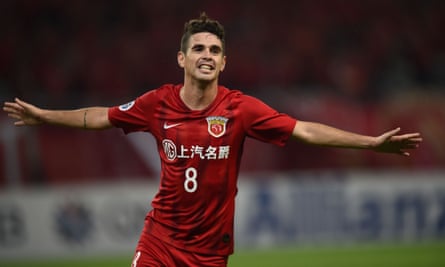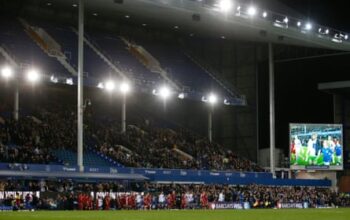Shanghai is China’s biggest city and commercial centre but the shining metropolis on the banks of the Huangpu River has never really led the way in the country’s football scene. In the 80s and 90s, Dalian and Liaoning way up in the north were dominant and, when the spending spree got under way in 2010, the southern giants Guangzhou ruled the roost.
This season is very different. With 21 of the 30 games of the 2024 Chinese Super League played, Shanghai Port are top with 57 points, two points above Shanghai Shenhua. Both are unbeaten, with the rest nowhere.
Shenhua are Chinese football’s nearly men. The Blues, who regard themselves as the city’s true club, last won the title in 1995 and finished second in five of the following six seasons. The championship they won in 2003 was stripped a decade later owing to match-fixing. In 2008, they missed out on the last day after Hamilton Ricard missed a penalty that would have won the title in a game moved from their Hongkou Stadium because of a Kylie Minogue concert.
Despite a passionate fanbase, that has been as good as it got and even when big names such as Nicolas Anelka, Didier Drogba and Carlos Tevez arrived, it was very chaotic. At the time, it was summed up by the training ground where a lovely sleek clubhouse with coffee machines, pastries and fruits on black shiny surfaces was next door to classrooms where youngsters studied under broken windows and crumbling floors.
If Shenhua, whose fifth-placed finish last season was their highest since 2016, make it this time then Leonid Slutsky will do something that Howard Wilkinson, Gus Poyet and Jean Tigana could not. It would surely be the biggest achievement in a career during which the 53-year-old, who arrived in January, led CSKA Moscow to various titles and took charge of Russia and Hull City. After losing his job as a TV pundit during the 2018 World Cup by mentioning Alexei Navalny, Vladimir Putin’s biggest critic, live on air, more international headlines are within reach.
“He has brought a calmness and adapted well to the team,” Jahanyar Mohebbi, the assistant coach at Port last season, says. Slutsky’s first game was a 1-0 win over Port in February’s Super Cup final. “That is the only loss for Port FC this season and it showed that the team is playing a different style of football,” Mohebbi says. “They have improved both in terms of offensive and defensive tactics, with a focus on positional play and solid defensive organisation. Slutsky deserves credit for this transformation.”
Over in the red corner, it has been a little different for Kevin Muscat. Shanghai Port are the defending champions and although the Australian has continued the success, the style has changed. Three years Slutsky’s junior, he already had an impressive CV, leading Melbourne Victory to the A-League Championship in 2015 and 2018 before succeeding Ange Postecoglou at Yokohama F Marinos in 2021. The following year the former Wolves, Rangers, Crystal Palace and Millwall defender led the Kanagawa club to the title. He left last December and although it may have been seen as something of a sideways step Muscat, who landed in Shanghai at the same time as his Russian rival, has not put a foot wrong.

“He arrived at a time when the team had resolved previous issues and regained hope and confidence,” Mohebbi says. “He was brought in to help Shanghai Port maintain their success, compete in China and the Asian Champions League. The club made strategic signings which allowed Muscat to find the right balance and create a strong starting lineup.”
The former Socceroo has parallels with Postecoglou in the way he plays, with tempo and a defensive line as high as can be. Port have won their past 14 league games, a record, and are a goal machine: 18 in the past three and 72 overall. Wu Lei has been scoring for fun and Oscar has been impressive in midfield.
after newsletter promotion
The Brazilian’s £60m transfer from Chelsea in 2016 led to histrionics from Antonio Conte and a warning that “Chinese football is a danger for all”. Oscar is about the only big foreign star remaining in China and the level of the league is not what it was, with the Shanghai clubs receiving better backing than most. The big spending had largely stopped even before Covid and the longest and strictest lockdown in the world took their toll.
Football slipped way down the list of the government’s priorities and a major downturn in the property market was also a huge factor with a majority of top-tier clubs owned by real estate companies. One of these was Evergrande which, with debts of $300bn to sort out, stopped bankrolling Guangzhou. The all-conquering South China Tigers, with eight league titles between 2011 and 2019, were relegated in 2022. Jiangsu FC, 2020 champions, folded soon after.
None of this is the concern of Muscat, Slutsky or fans in the city. There are nine games between them glory. Their meeting on 17 August could be pivotal, the biggest Shanghai Derby and biggest game in Chinese football for years. If these two coaches continue to impress, it may stay that way for some time.
Source: theguardian.com


